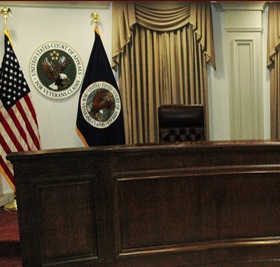 Of course they aren't. Or maybe they are, I don't know.
Of course they aren't. Or maybe they are, I don't know.
Frankly, unless they have a VA claim they need help with, there probably isn't anything here they'd want to read. On the other hand, the Veterans Law Blog is the oldest running lawyer's blog on VA Disability Compensation claims and appeals.
However, by reason of some weird cosmic coincidence, the Court issued a precedential decision on an issue that I posted about in my blog the preceding Monday.
Let's revisit that post, and the Court's decision, and solidify a major take-away point:
Last week I told you about the Presumption of Regularity ... but do you remember one of the Take-away Points? I said:
"...make sure that the VA shows both the regular procedure and argues that they followed it. If not, then they may not be entitled to the presumption in the first place."
The day after I posted that blog post, the Court of Appeals for Veterans Claims remanded a case to the BVA on those precise grounds.
A Veteran filed a claim to reopen a previous denial of service connection of tinnitus (ringing in the ears).
After bouncing through the VA Claims Hamster Wheel for a couple years, the BVA finally concluded that the Veteran had reopened his claim, but that the VA needed evidence of the degree of impairment to assign the proper rating. So the BVA ordered the VA to schedule a C&P exam.
Well, the Veteran appears to have missed the C&P Exam - he claims he never got the notice of the exam* - and the VA dismissed the claim.
The Veteran appealed the denial, and his case wormed its way back through the VA Hamster Wheel, up to the Federal Circuit and back down to the CAVC.**
Ultimately, the CAVC sent the case back to the BVA with this direction:
Accordingly, the Court will vacate the Board decision and require the Board to support its finding that VA's notification duties were fulfilled (i.e., notice of examination sent to correct address of record). If, on remand, the Board bases its finding on the presumption of regularity, the Board should explain in detail the regular and established procedure that VA follows to schedule medical examinations and provide notice of the scheduled examination to claimants.
What does this mean for you, in plain English:
If the VA claims it has a regular procedure in place, and that they are entitled to the presumption that they followed that procedure, ask the DRO or BVA fact-finder (on the record) to explain in detail the regular procedure that the followed. Otherwise, they may not be entitled to rely on that procedure.
* One interesting note - the VA claims in this decision that it cc'd the Veteran's attorney on the Notice of C&P Examination. I am really eager to learn how the VA explains this - I've been representing Veterans since 2007, in Regional Offices around the nation, and I have NEVER been cc'd on notices of C&P exams to my clients. Not once. Even when I ask. So, methinks that the VA should be very careful how it defines its "regular procedure", lest it get caught playing a shell game. Again.
** There were some other issues in this case, mostly having to do with whether the CAVC could accept evidence in the form of affidavits from the VA. The Court explained to the VA the difference between evidence and argument, and rejected the notion that it could consider evidence first introduced on appeal and certainly could not make findings of fact in the first place, based on that evidence. You can, of course, ALWAYS submit new evidence before the VA Regional Office and the BVA - when submitting Lay Evidence, my law firm uses the Sworn Declaration format.
Chris Attig, an Accredited Veterans Benefits attorney and Founder of the Attig Law Firm, PLLC is responsible for the content of the site. The principal office of Attig Law Firm, PLLC, is located in Dallas, Texas. Chris Attig is NOT Certified by the Texas Board of Legal Specialization. - Please view our website disclaimer.
©2007-2013 Attig Law Firm, PLLC
Leave a Reply